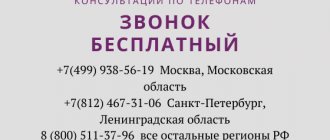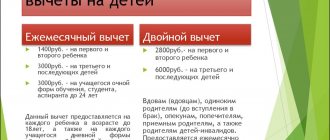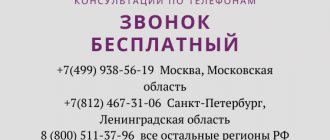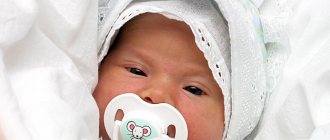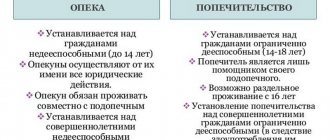The birth of a child in a family is not only a joyful event, but also additional costs. For this reason, the state seeks to support citizens who decide to raise not only their own children, but also take adopted ones.
Dear readers! The article talks about typical ways to resolve legal issues, but each case is individual. If you want to find out how to solve your particular problem , contact a consultant:
8 (800) 700 95 53
APPLICATIONS AND CALLS ARE ACCEPTED 24/7 and 7 days a week.
It's fast and FREE !
People who have adopted a child left without parental care into their family are provided with payments upon adoption of the child.
Today there is a whole list of financial benefits available to adoptive parents. To know them all, you need to carefully study the current information on the topic.
General concept
Adoption is the process of accepting a child left without parental care into a family. The term is perceived in a general manner, regardless of its gender. In the process of adoption, both parties acquire rights and responsibilities towards each other, in no way different from legal relations in an ordinary family.
The adoptive parent assumes responsibility for the child:
- on his material support;
- to create conditions for obtaining education, including professional education;
- to ensure comfortable living conditions.
An adopted child receives all the rights of a native child. In addition, he has the same responsibilities towards new parents.
Guardianship and trusteeship authorities are obliged to monitor the fulfillment of their duty by adoptive parents. If serious violations and abuses are detected, they go to court to cancel the adoption.
Rights of adoptive parents, guardians and foster parents to special benefits
Despite the fact that adoption and guardianship/trusteeship do not imply financial remuneration for the adoptive parent or guardian/trustee, current legislation provides for a one-time payment upon the transfer of the child into foster care (Article 12.1 of the Law “On State Benefits...” dated May 19, 1995 No. 81-FZ ). The adoptive parent also has the right to receive it, although his education services will be paid. The amount of the fee is fixed in the foster family agreement.
Thus, regardless of the form used for placing a child in a family, both the adoptive family and the adoptive parent or guardian/trustee will receive the lump sum payment due for this in 2019. However, only one person can become the recipient of the payment if there are several adoptive parents, guardians/trustees or adoptive parents. In this case, such an allowance is paid for each child.
To receive payments upon adoption of a child, establishment of guardianship/trusteeship, or transfer to a foster family, the recipient of the benefit should submit an application at the place of residence to the body authorized by the region of the Russian Federation to consider this issue. Applications can be made in person, by post or electronically.
The application will need to be accompanied by a set of documents confirming the right to receive benefits (including in an increased amount) and the absence of parents for children (clauses 34, 35 of the Procedure for assigning state benefits, approved by order of the Ministry of Health and Social Development of Russia dated December 23, 2009 No. 1012n).
Funds are paid no later than 10 calendar days from the date of registration of the fact of acceptance of the application by the authorized body or sending the required set of documents by mail (clauses 37, 38.1, 38.2 of the Procedure approved by Order No. 1012n). If the set of documents attached to the application is incomplete, the applicant will receive written explanations about this. The missing documents must be submitted no later than 6 months from the date of receipt of clarification - then the date of the application is considered to correspond to the original one (clause 38.3 of the Procedure approved by Order No. 1012n).
Regional measures to support adoptive parents
There are many adoption assistance programs available at the regional level. Their size and shape depend entirely on the initiative of local authorities. Example: in the capital and Moscow region, unusual families receive regional capital - it amounts to almost 100,000 rubles.
Additionally, Moscow parents receive a one-time payment of 30,000 rubles. The payment comes to the parents' personal account. Adoptive families receive regular subsidies: the amount in Moscow is 10,000 rubles.
The benefit is awarded to fathers and mothers who perform their duties in the best possible way: the baby’s health is checked and an additional survey is conducted.
State support for adoption
Federal legislation contains a number of preferences for adoptive parents. They can be divided into the following groups:
- social support;
- tax benefits;
- preferences in the field of labor activity.
Local benefits for adoptive parents are more varied. However, they come down to measures of social support for families raising orphans.
A family that has adopted someone else’s child may qualify for the following social support measures:
- maternity leave with all payments (if you took a baby up to 3 months old);
- obtaining a certificate for maternity capital (provided that there are two or more children in the family);
- lump sum adoption benefit;
- monthly payments to the mother until the child reaches 1.5 years of age;
- preferential enrollment and free meals in kindergartens and schools;
- free medicines for children under 3 years of age;
- reimbursement of expenses for housing and communal services;
- reimbursement of 50% of the cost of kindergarten expenses.
Benefits are provided only if the child is adopted from an orphanage. If children of a spouse from a previous marriage are adopted, no benefits are provided. Except for maternity leave.
The law makes no difference between parents. Maternity leave and monthly payments can be provided to the father if desired.
Who is covered by government support programs?
The assignment of preferences and their material expression depends on the conditions of adoption, including the health of the children. So, the one-time benefit when joining a family is as follows:
- healthy child - 16,350.33 rubles. (from February 1, 2017);
- disabled person - 124,929.83 rubles.
However, benefits in the field of labor relations apply exclusively to people with an official place of duty. For example, these include preferences such as:
- restrictions on involvement in night shifts and overtime work;
- ban on working on weekends and holidays;
- provision of vacation in the summer.
Preferences for working parents are described in Art. 264 Labor Code (LC). They are the same for biological parents and adoptive parents.
Financial support measures for adoptive parents
Payments to people who take in stepchildren can be further divided into:
- are common;
- special.
The first refers to those benefits and benefits that are due to biological parents. At the same time, there are payments accrued only to adoptive parents.
Maternity money
If the baby transferred to the family is less than three months old, then one of the parents has the right to apply for maternity leave. In practice, this is done in the same order as at the birth of a child:
- You should contact the antenatal clinic with documents.
- The doctor will register the woman and issue a sick leave certificate.
- This document is submitted to the administration of the enterprise.
- The accounting department will calculate and pay the usual maternity benefit.
When adopting twins, the period for requesting benefits is extended to 110 days, usually 70 days.
Benefits apply only when adopting a child from orphanages!
Benefits regarding material payments are provided to adoptive parents only of those children who lived in orphanages.
If an intra-family adoption occurs, for example, a stepfather adopted his wife’s child, then the state does not pay benefits.
However, in such cases, the adoptive parent can take advantage of a number of other options available to biological parents. Among them is the opportunity to take out sick leave in order to treat a child in case of illness or take a vacation for up to 3 years.
Cash benefits are paid to large or low-income families. In other situations, benefits apply only to those parents who connected their lives with a child from an orphanage.
List of payments and benefits
In accordance with the law, citizens who have adopted a child have the right to receive a number of payments and benefits. Financial incentives are intended to promote adoption in the country.
However, it is necessary to separate the concept of intra-family adoption from the adoption of a child into a family without parental care. If a husband adopts his wife's son through the court, this is intra-family adoption. Benefits do not apply to him.
In 2020, the following support options for adoptive parents are provided:
- federal benefit for the adoption of a minor into a family (analogous to a benefit for the birth of a baby);
- maternity payments and child care benefits from 0 to 1.5 years;
- maternity capital (if the adopted child is the second or subsequent child);
- preservation of the adopted person's rights to pensions and benefits.
In addition, it is necessary to pay attention that adoption, as a form of placement, involves accepting the child as a natural one. Therefore, financial incentives for adoptive parents are minimal. Guardianship and guardianship are much better funded.
One-time benefit
When a minor is accepted into the family, an appropriate allowance is paid. It is transferred only 1 time.
The payment is of a declarative nature. The adoptive parent must independently contact the social protection department.
The application period is limited to 6 months . If he misses the deadline, he must be reinstated through the courts.
List of documents for receiving benefits:
- passport;
- statement;
- child's birth certificate (new);
- documents on the absence of parental care;
- court decision on adoption;
- extract from the house register;
- bank account details;
- a certificate that the benefit was not assigned or paid to the spouse;
- documents confirming the existence of grounds for receiving an increased payment.
The funds are transferred to the personal account of one of the adoptive parents. They are not targeted and the recipient does not have to account for them.
The amount of payment depends on a number of factors:
- General order . A citizen receives 17,479.73 rubles. The amount is subject to annual indexation. In addition, it increases if a regional coefficient is applied.
- Special cases . In certain cases, the adoptive parent has the right to increased benefits. In 2020, its value is 133,559.36 rubles. The amount also increases due to the regional coefficient. It is intended for citizens who have adopted disabled people, brothers and sisters, as well as children aged 7 years and older.
Payments upon adoption of a newborn
In case of adoption of a child aged 0 to 1.5 years, citizens have the right to all payments that are due to the birth family.
Types of payments paid by the state:
- maternity payments (when adopting a child aged 0 to 3 months);
- allowance for children from 0 to 1.5 years;
- allowance for a child from 1.5 to 3 years old (50 rubles per month).
The procedure for calculating benefits for a child from 0 to 1.5 years
For the employed For the unemployed
| Minimum for first child | 4512 | 3277,45 |
| Minimum for second and subsequent children | 6554,89 | 6554,89 |
| Calculation procedure | 40% of average salary | Fixed amount |
Maternal capital
If adoptive parents have adopted a second or subsequent child into the family, then they have the right to maternity capital. The opportunity arises if citizens have not used the right before.
The amount of support measures in 2020 is 466,617 rubles. When adopting 2 children at the same time, citizens also have the right to receive a certificate.
When an adoption is registered, a child left without parental care loses the right to receive housing from the state. The responsibility for providing housing rests with the adoptive parents. Therefore, when capital is spent on purchasing housing, children have the right to a share in the apartment.
Pensions and benefits
In accordance with Art. 138 of the RF IC, in case of adoption of a child, he retains the rights to pensions and benefits that he previously received. The minor will remain the recipient:
- singing for the loss of a breadwinner;
- compensation for the death of parents and other payments.
However, the right to receive alimony from both parents and grandparents is lost. If financial support was collected from the mother and father, but they did not contribute funds, then the accrued debt is retained.
The right to inheritance from blood parents and grandparents is also lost. An exception is the situation when the court has preserved the property and personal non-property rights of the grandparents in the event of the death of a parent (Clause 4 of Article 137 of the RF IC).
Regional payments
Each region has the right to establish additional payments. Their size, procedure for appointment and transfer are regulated by the legislation of the constituent entity of the Russian Federation.
Example. In 2020 in Moscow, upon adoption, 61,000 rubles are paid. from the city budget.
In other regions, monthly payments are provided.
Example. Adoptive parents of the Altai Territory who adopted a child who has been under guardianship for at least 3 years retain the right to receive guardianship benefits.
Not all regions give money to adoptive parents. This issue needs to be clarified in the social protection department of the subject.
What benefits are provided for orphans?
The following payments are provided for this category of children:
- If the child has not reached the age of two years, then the parent has the right to receive products from the dairy kitchen ;
- From the age of three, a child has the right to receive free medications prescribed by a doctor;
- Parents are refunded the money they paid for housing and communal services bills;
- If the child is a refusenik or a foundling, then an additional amount is paid every month ;
- Reducing fees in preschool institutions by 50% . Such children have the right to receive two meals a day in schools;
Once the adoption is formalized, the biological parents have no rights to the child and cannot restore their rights. In turn, adoptive parents have limited rights, and a child, according to documents, is considered adopted at the age of up to 18 years, in extreme cases up to 23 years while undergoing training.
In case of adoption of a child, payments are provided for up to 1.5 years . This payment is made to one parent at the place of work. If the parent does not work, then in this case, he needs to apply to social protection at his place of residence.
Please note that adopting a child is a fairly important step that must be approached very responsibly and not be guided by the payments that the state offers or does not offer. If this is the step you have taken, then you need to take care of the child and give him the feeling of a real family. Every child needs protection and reliable support from adults.
List of benefits
In addition to financial support, the adoptive parent has the right to receive special benefits. Among them:
- leave for the adoptive parent;
- obtaining the status of a large family.
Vacation
In accordance with Government Decree No. 719 of 2001, the adoptive parent has the right to be granted leave.
It is similar to maternity leave and parental leave up to 3 years of age.
Moreover, at the request of a citizen, the adoptive parent's leave can be replaced with the corresponding leave for natural parents. This measure is provided for families who decide to keep the adoption secret (Article 139 of the RF IC).
Leave is provided if you adopt a child aged 0 to 3. If citizens exercise the right to change the date of birth and reduce the age, then the date when the child turns 3 years old according to the new birth certificate is taken into account.
Status of a large family
The law provides parents with the opportunity to obtain the status of a large family. The procedure for obtaining a certificate varies depending on the region.
In most regions, a family with at least 3 minor children is considered to have many children. Moreover, adopted children are also included in the family.
Large families receive a number of benefits:
- to pay for utilities;
- getting children ready for school;
- for medical care.
In addition, regions can establish additional benefits. For example, in Moscow, large families are granted free parking rights.
By adopting a baby, the family accepts him as their own child. Therefore, its provision rests entirely with the new parents. However, the state provides financial support.
Monthly cash payment (MAP)
The size of the monthly cash payment depends on whether the family with a disabled child plans to fully or partially use their privileges with the NSO or refuse them, replacing them with cash compensation.
From February 1, 2020 to January 31, 2021, the amount of EDV will be 1,627.61 rubles, and if you refuse the entire NSO - 2,782.65 rubles.
Table with the amount of monetary compensation in case of refusal of a set of social services in 2020
To receive EDV, you need, as when receiving a disability pension, to contact the Pension Fund office by writing an application and providing:
- Applicant's passport (confirmation of residence in the Russian Federation)
- Application for receiving EDV
- Child's birth certificate
- MSEC inspection report (extract from it)
- Application for complete or partial waiver of NSO
What they write on the Pension Fund website, what documents are needed.
Monthly payments for a child
The amount of payments for the maintenance of a child adopted into a family is established in accordance with the regulations of the constituent entities of the federation. Monthly benefits are paid for the entire period when the subject had the right to receive it. But only if all documents were submitted no later than 6 months before the end of the payment period.
At the state level, trustees and guardians are provided with monthly tax deduction benefits. The amount of personal income tax deductions for adoptive parents, guardians, trustees and their spouses varies depending on the number of children the family has adopted.
To exercise your right to receive monthly payments from the regional budget, you must independently familiarize yourself with the local legislative framework and then contact the local social security service (at your place of residence).
Under guardianship
As an example, let's take monthly benefits for a child who was adopted into a family in St. Petersburg. In this case, the funds paid for adopted children will amount to 10,444 rubles (including indexation for 2020). Wherein:
- the child must be registered in St. Petersburg;
- money is not paid for children who are fully supported by the state;
- payments stop if the child is re-registered in another locality, after reaching adulthood, due to the death of a guardian or ward.
If we take Moscow as an example, here the following payments are provided for the maintenance of one child who is placed in a family for upbringing:
- in the general case – 15-20 thousand rubles;
- when registering guardianship over 3 or more children – 18-23 thousand rubles;
- for children under 18 years of age with disabilities – 25 thousand rubles.
In a foster family
For each adopted child registered in St. Petersburg, the foster family will receive 10,444 rubles (in 2020); in other regions, other payment amounts are established. Plus, foster parents are also credited with work experience.
Payments to parents are accrued from the month in which the foster family agreement was signed. And subsequently - monthly, no later than the 20th, by bank transfer to the foster parent’s account or by postal transfer. In accordance with the price growth index, this amount will be recalculated annually.
To arrange the transfer of payments in St. Petersburg, you must contact the local government authorities. The transfer of money may stop if the contract was terminated at the initiative of one of the parties, or for some other reasons.
In Moscow, in accordance with Moscow Government Decree No. 492-PP dated May 26, 2009, monthly payments will be:
- 15 thousand rubles – for a child under 12 years old;
- 20 thousand rubles – for a child 12-18 years old.
The amounts will increase if a disabled child or three or more children are taken into care.
What are the payments in 2020?
All amounts accrued to citizens are indexed. This also applies to the amount that a parent receives once upon adoption, registration of guardianship or patronage.
So, for example, the amount of 13,087.61 rubles in 2020 will be 15,000 rubles .
But, if you adopt a child at a certain period of his life, then the amount can increase to 105 thousand . In order to receive this payment, you must submit documents that will indicate blood relationship - a birth certificate. These categories include:
- Children who have reached school age;
- If there is an adoption into the family of not one child, but several (brothers and sisters - blood relatives);
- A child who has become disabled and has not reached the age of 18;
Other payments available to adoptive parents
Payments upon adoption of a child also include amounts received by ordinary parents in the form of:
- Maternity capital intended for families in which a second and subsequent children appear (clause 1, article 3 of the law “On additional measures...” dated December 29, 2006 No. 256-FZ). The amount of payment for the adoption of a child in 2020 will be 453,026 rubles. (Clause 1, Article 8 of the Law “On the Federal Budget...” dated November 29, 2018 No. 459-FZ). However, these funds have strictly established areas of use, are issued with a certificate and are issued in the form of cash only in parts and in a limited number of cases (Clause 3 of Article 7 of Law No. 256-FZ).
- Monthly payments to insufficiently wealthy families due to the birth of their first or second child (Clause 2, Article 1 of the Law “On Monthly Payments...” dated December 28, 2017 No. 418-FZ). In this case, the guardian can also receive payments for the first child. For the second of the children, these payments are made at the expense of maternity capital (Clause 4, Article 1 of Law No. 418-FZ). The size of the payment is determined by the child's subsistence minimum established for the region for the second quarter of the year preceding the year of application for it (clause 5 of Article 1 of Law No. 418-FZ).
Thus, in terms of payments for the adoption of a child, adoptive parents differ from ordinary parents in the impossibility of receiving certain benefits (for registration in the early stages of pregnancy and issued at the birth of a child), as well as in the limitation of the duration of maternity leave when adopting an infant. Otherwise, their rights to social security correspond to the rights of a regular parent.
Procedure
To receive payments for an adopted child, you need to submit the necessary documentation to local authorized bodies. It is necessary to do this within 6 months from the entry into force of the court decision on adoption.
If you did not meet the deadlines, but there is a good reason, then when submitting documents you will need to reapply to the court.
If financial benefits were denied, you should file a claim with the court, which will most likely make a decision in favor of the guardians.
If all the necessary documents have been collected and the rules have been followed, then within a 10-day period from the date of submitting the documents, the money will be transferred to the adoptive parents’ account.
Guardianship and adoption
Having found out what payments are due to guardians, it would not hurt to find out in what cases it is possible to obtain the right to adopt a baby from an orphanage. At first glance, the operation seems to be quite simple, because the state benefits when children are in families. But still the process itself is not so easy. So what is necessary to place a child in a new family?
The legislation of the Russian Federation gives the right to care:
- a specific baby;
- selected from specialized places of guardianship authorities.
Conditions that potential parents must meet:
- must not have a criminal record for committing serious acts (except for persons exonerated from criminal liability on rehabilitation grounds);
- must be of legal age and legal capacity;
- are not deprived of parental rights in relation to other children:
- do not have diseases that are contrary to the law;
- must not be of the same gender;
- mandatory possession of living space for registering a child.
But these are not all the conditions, since the last word still remains with the guardianship authorities. For proper upbringing and pedagogical approach, future parents must undergo a “school for adoptive parents.”
The next step will be collecting documents, namely:
- certificate of no criminal record - obtained from the police department;
- health certificate - issued after undergoing medical examination;
- Form 2-NDFL - issued at the place of work;
- extract from the house register;
- certificate of ownership of real estate;
- written consent of biological parents (if any);
- for children over 10 years old, their consent will be required.
Having collected the necessary documents and certificates, they are submitted to the guardianship authorities. Within 10 days, guardianship staff will come and inspect the standard of living and living conditions. After which an act is drawn up and a claim is filed in court, since the case is heard there. And the law comes into force only after 30 days from the date of the decision.
Can a disabled person adopt a child?
The law prescribes restrictions for potential adoptive parents with health problems. But disability does not always become an obstacle; it all depends on the group and the specific disease.
1 group
It is worth understanding that disabled people of group 1 are not allowed to adopt. The fact is that people in this situation are physically unable to fully raise and provide for a child. They themselves need outside help, have lost the ability to work, and it’s difficult even for a disability pension alone, not to mention supporting a child.
2nd group
Can a disabled person of group 2 adopt a child? This category in itself is not an obstacle to adoption. The second group is also working, giving the opportunity to support themselves and the adopted child and raise him.
However, there is a nuance: there is a list of diseases that make adoption impossible. If disability is caused by one of them, the guardianship authorities will refuse:
- Tuberculosis of any localization requiring dispensary observation.
- Mental illnesses and deviations for the entire period of registration and observation.
- Complex infectious diseases until complete recovery.
- Oncology in severe stages.
- Proven addictions: drug addiction or alcoholism.
In other cases, disabled people of group 2 can apply for adoption if they meet the other criteria.
3 group
Remember: a disabled person of group 3 has the right to adoption! Typically, this group is received by people with less serious illnesses than in 1 and 2, therefore they have fewer restrictions on work and life, and it is easier for them to adopt a child. Again, if the group is not related to the diseases from the list.
The following video talks about which groups of the population can become parents of adopted children, and whether a group 3 disabled person can adopt a child:
Rights and obligations
After entering into a family relationship, certain responsibilities are imposed on the parents and the child. Thus, parents are obliged to :
- maintain the child in material prosperity;
- cultivate cultural, moral and physical qualities;
- provide secondary education;
- do not cause harm to health.
Children, in turn, should:
- grow and develop in the family;
- contact parents and all relatives.
We will not discuss pampering, pranks, running away from home, and other pranks.
How much does the state pay for pregnancy and childbirth?
Maternity supplement is paid to citizens who have adopted a child under 3 years of age, the minimum payment is 28 thousand 555 rubles.
The period for requesting benefits must not exceed 70 days from the date of birth of the child. If guardians have taken in two or more children, the period increases to 110 days. Per month
If the baby has reached the age of 1.5 years, the adoptive parents will receive a monthly allowance for the adoption of a child in the amount of 40% of the average earnings for the last year.
If over the previous 12 months the adoptive parent did not have an official place of work, then he will receive a fixed benefit.
With a base rate of 1 thousand 500 rubles per child, the minimum amount of such payment is 2 thousand 576 rubles.
If you adopted two or more children, the minimum benefit will be 5 thousand 153 rubles with a base rate of 3 thousand rubles. Compensation is paid on specific dates each month. Also, adoptive parents will receive an additional payment of 50 rubles with the regional coefficient every month when the child reaches one and a half years and up to the age of three.
Do I need a report on the use of state aid?
Domestic legislation equates the institution of adoption with biological kinship. This means that parents have the same rights and responsibilities towards their children, regardless of blood ties.
The state provides additional assistance to adoptive parents so that they can take more care of their children and experience fewer difficulties. There is no need to account for budget money.
The fulfillment of parents' responsibilities is controlled by the guardianship and trusteeship authorities. This applies to all areas of life, including the material support of children.
